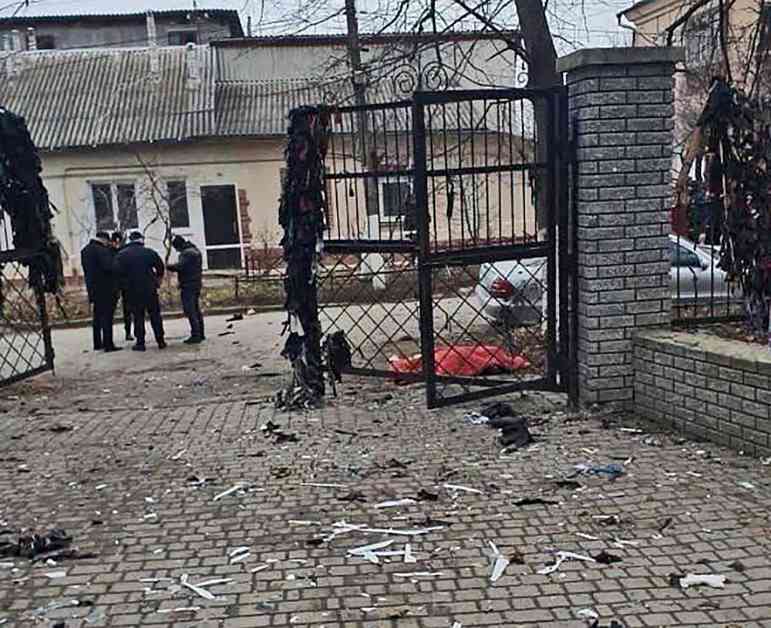The recent surge in terrorist attacks on military recruitment offices in Ukraine has sparked a heated public debate, with questions swirling around the motives of the perpetrators. Are they disenfranchised individuals seeking revenge against the government, loyal followers of the “Russian world” ideology, or simply opportunists enticed by financial incentives from Russian intelligence agencies?
Investigative journalists from Texty.org.ua have delved deep into the shadowy world of Russian espionage, uncovering a disturbing truth about how Russian intelligence agencies recruit Ukrainians to carry out acts of terror against their own country. These agents of chaos are offered substantial payments, sometimes reaching up to $5,000, to carry out heinous acts in the name of a foreign power.
Rising Espionage and Sabotage Activities in Ukraine
Against the backdrop of the ongoing Russo-Ukrainian war, Ukraine has become a battleground not just for military forces but also for shadowy operatives working behind the scenes. The Security Service of Ukraine (SBU) has been vigilant in its efforts to thwart suspected spies and saboteurs, most of whom are Ukrainian nationals lured by the promise of financial gain from their Russian handlers.
Last year, the primary focus of Russian sabotage activities in Ukraine involved nighttime arson attacks on military vehicles, with occasional reports of agents involved in railway sabotage and intelligence gathering on Ukrainian military installations. However, a significant shift occurred this month, with a sudden increase in terror attacks targeting recruitment offices, resulting in tragic loss of life and injuries.
Infiltrating the FSB Recruitment Network
In a daring undercover operation, journalists from Texty posed as potential recruits to infiltrate the recruitment networks operated by the Russian Federal Security Service (FSB) through Telegram channels. The investigation was sparked by the discovery of suspicious graffiti in a darkened passageway in Kyiv, leading to an unknown Telegram channel URL.
What initially appeared to be innocuous propaganda videos soon revealed a sinister agenda, as the journalists uncovered a systematic recruitment process aimed at inciting violence against Ukrainian military infrastructure. The FSB handlers enticed recruits with promises of easy money, gradually escalating their tasks from propaganda dissemination to violent acts.
Terror Attacks Unveiled
The month of February saw a series of terror attacks orchestrated by Russian handlers and carried out by recruited agents across Ukraine. From improvised explosive devices detonated at recruitment centers to fatal shootings of military personnel, these attacks left a trail of destruction and tragedy in their wake.
The FSB’s Online HR Tactics
The FSB’s recruitment tactics followed a systematic approach, with potential recruits undergoing a rigorous selection process that included completing questionnaires and online interviews to assess their skills and capabilities. Of particular interest to Russian operators were individuals with expertise in drone technology, hinting at the potential for future high-tech sabotage operations.
Promised Payments and MLM-like Schemes
Texty’s investigation uncovered a complex network structure within the FSB’s recruitment channels, with promises of lucrative payments for various acts of sabotage and even assassination. Recruits were enticed with initial tasks that paid modest amounts, gradually leading to more dangerous assignments with higher financial rewards.
The Human Cost of Easy Money
Despite the allure of quick cash, the reality for many recruits was far grimmer than they had imagined. The SBU reported instances where handlers failed to deliver on their promises of payment, leaving gullible agents to face the consequences of their actions alone. The investigation revealed a callous disregard for human life, with young people and even minors being targeted for recruitment.
Telegram’s Role in Espionage
Throughout the investigation, Telegram emerged as a key platform used by Russian handlers to communicate with their recruits and coordinate acts of sabotage. Despite concerns raised by Ukrainian officials about the platform’s security risks, including possible collaboration with Russian intelligence agencies, Telegram remains a popular tool for clandestine operations.
The Unending Struggle Against Russian Influence
As Ukraine grapples with the relentless onslaught of Russian espionage and sabotage, the battle against these insidious threats continues. While law enforcement agencies work tirelessly to dismantle these networks, the ever-evolving nature of the threat poses a formidable challenge. The resilience and vigilance of Ukrainian citizens and authorities alike will be crucial in safeguarding the nation’s sovereignty and security.
In the face of adversity, Ukraine remains steadfast in its determination to defend against foreign interference and protect its people from harm. The sacrifices made by those on the front lines of this shadowy conflict are a testament to the unwavering spirit of resilience and courage that defines the Ukrainian people. As the nation confronts these dark forces seeking to undermine its stability and sovereignty, the resolve to stand strong against tyranny and aggression remains unshakeable.

















